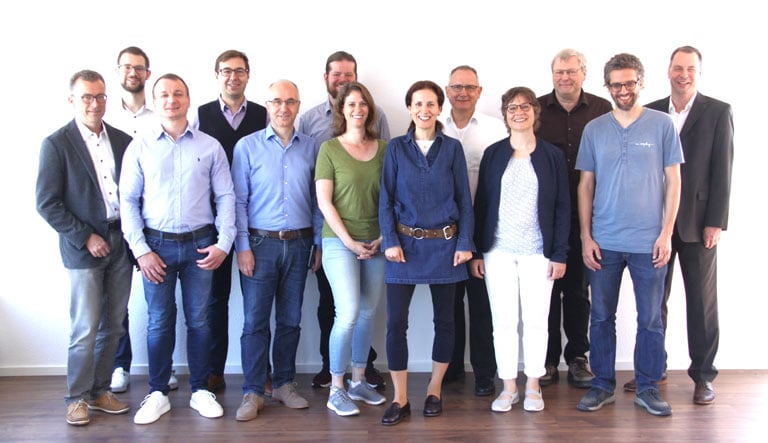Tecan uses cookies to improve our website. By continuing to browse our website, you accept our cookie policy.
Tecan uses cookies to improve our website. By continuing to browse our website, you accept our cookie policy.

The human gut microbiome has been found to affect metabolic health and nutrient absorption, and preliminary research also suggests that it contributes to the development of the immune response, food allergies and intolerances, obesity, and a wide range of other conditions. This field is the focus of Ortho-Analytic, an integrative medicine laboratory based in Wallisellen, Switzerland, that identifies bacterial, fungal and parasite DNA found in stool samples. The company uses molecular genetic analyses to build a detailed picture of a patient’s gut microbiome, aiding practitioners in formulating specific treatment plans.
The demand for gut microflora analysis has been growing rapidly over the last few years due to recent discoveries that bacteria in the digestive tract can have significant impacts on our general health. However, many smaller facilities are now struggling to keep up with the increased workflow. One solution that addresses this challenge is the automation of DNA extraction from stool samples, which represents an important step towards increasing lab throughput and reducing costs, and offers the potential to open up the medical benefits of microbiome profiling to greater segments of the general public. This approach was the one taken by Ortho-Analytic for its specialist service providing the detection and analysis of bacterial DNA present in patients’ stool samples.
 Members of the microbiome project team at Ortho-Analytic
Members of the microbiome project team at Ortho-Analytic
Ortho-Analytic extracts bacterial, fungal and parasite nucleic acids from stool specimens using the DreamPrep™ NAP workstation and the ZymoBIOMICS™ 96 MagBead DNA Kit from Zymo Research, minimizing contact time with the samples and reducing the likelihood of introducing manual errors. The system also incorporates the Frida Reader™ module for built-in quantification and normalization. Dr Philipp Lemal, deputy laboratory manager at Ortho-Analytic, explained: “We tested several DNA extraction kits, and found that the one from Zymo Research was the best for our application. Tecan had already automated this kit for use on its DreamPrep NAP system, so we could purchase the whole package and save ourselves a lot of time in the validation process.”
It took under two weeks for the system to be fully calibrated and adjusted in the lab, and it has proven to be very robust and reliable, allowing staff to perform other tasks while the machine runs in the background. The team has found the workstation itself to be very flexible, enabling employees to easily add or change scripts as necessary to fine-tune the extraction process. Philipp described how the move towards automation has had a positive impact on the lab’s productivity: “Before we had the DreamPrep NAP workstation, we did all of our extractions manually, and could only process a maximum of 40 samples per day. The DreamPrep NAP now automates most of our workflow, which has increased throughput more than fivefold to around 200 samples per day. The Frida Reader module also allows us to measure DNA concentration straight after we extract it, all on the same machine, and that’s very convenient.”
Philipp spoke about the team’s current and upcoming research projects: “At the moment we are collaborating with several universities all over the world that are using our technical platform for their research. We also hope to be involved in a greater number of long-term studies in the near future, which will help the research community to be able to clearly associate the microbiome with many conditions, including cancers and inflammatory bowel disease.”
The DreamPrep NAP now automates most of our workflow, which has increased throughput more than fivefold to around 200 samples per day. The Frida Reader module also allows us to measure DNA concentration straight after we extract it, all on the same machine, and that’s very convenient.
To further improve the quality of microbial DNA extraction, Ortho-Analytic has collaborated with BÜHLMANN Laboratories to develop its own sample tube, the Calex NGS. The tube contains a special stabilization buffer that kills bacteria, viruses and fungi and hinders biological activity inside the tube to stabilize DNA prior to extraction. This ultimately produces a more accurate and realistic representation of microbiome composition for each sample. Until recently, the lab was sending the samples to an external partner laboratory for DNA extraction and molecular genetic analysis. However, the team was concerned about sample stability during transport due to the long transit times and inconsistent storage conditions. This limitation motivated staff to begin performing microbial DNA analysis themselves, with the aim of preserving their specimens and providing faster, more reliable results. These workflow adjustments promise to enhance the speed and quality of both DNA extraction and analysis, increasing the lab’s capacity to meet the demand for microbiome profiling well into the future. Philipp concluded: “We are really happy that we can finally do all our DNA extraction and analysis in house, and we hope that this will greatly benefit our clients and their patients going forward.”
For Research Use Only. Not for use in clinical diagnostics.
To learn more about Ortho- Analytic, visit orthoanalytic.ch
For more information about Tecan’s genomics applications, visit lifesciences.tecan.com/ applications_and_solutions/ genomics